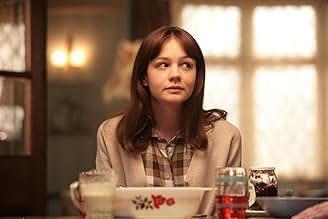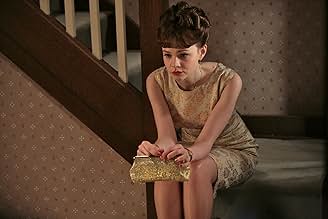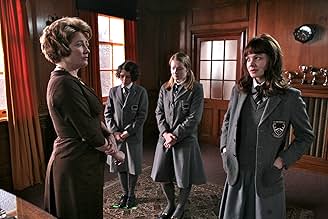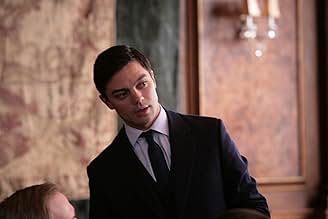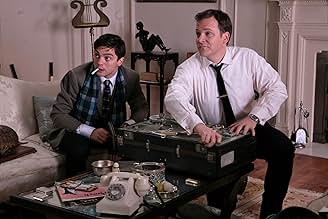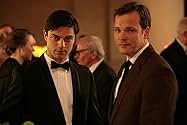Eine Coming-of-Age-Geschichte über ein Teenager-Mädchen im London der 1960er Jahre. Ein doppelt so alter Playboy verändert stellt ihr Leben auf den Kopf.Eine Coming-of-Age-Geschichte über ein Teenager-Mädchen im London der 1960er Jahre. Ein doppelt so alter Playboy verändert stellt ihr Leben auf den Kopf.Eine Coming-of-Age-Geschichte über ein Teenager-Mädchen im London der 1960er Jahre. Ein doppelt so alter Playboy verändert stellt ihr Leben auf den Kopf.
- Regie
- Drehbuch
- Hauptbesetzung
- Für 3 Oscars nominiert
- 36 Gewinne & 96 Nominierungen insgesamt
Kate Duchêne
- Latin Teacher
- (as Kate Duchene)
Empfohlene Bewertungen
An Education
Take a star high school senior shooting for Oxford, and add a charming man more like thirty who seduces her (and you) with his utterly kind, gentle, clever, and generous nature.
You can guess what follows. And in a way, that's the let down of the whole thing. The idea is a simple one, yet it unfolds so beautifully, with some extraordinary acting, it is quite engrossing. John Peter Sarsgaard as David, the seducer, is totally convincing, even though we know fairly early that something isn't quite what it seems. As events gradually devolve, so does his character, to a final, deflated ending. The heroine, Jenny, swept into the mess, is played with predictable delicacy by Carey Mulligan, and in a surprise she is really a great supporting role, of sorts, for Sarsgaard, even though she is the star.
Part of the appeal of the movie is the period, early 1960s, as England is finally getting out of the huge debts and doldrums of World War II and the swinging 60s are ready to fly (the Beatles are together but not well known). The old fashioned world, conservative and conventional, of Jenny and her family is dismal and yet comfortable, adorned with small worldly decorations. David brings Jenny to modern life, with its jazzy clubs and trips to Paris, and it's hard not to say his version of life is far superior. Oxford, after all, is so old-school.
It's a joy on all these levels. It doesn't quite have the naturalness it always needs, a few are scenes forced, and the plot lacks complexity (not that complexity is needed, but it needs something to layer it up). Most off-putting of all is the overly precocious Jenny, whose speeches to her schoolmistress and her teacher, and to David, sound like literature, not like a real 17 year old struggling to escape a sheltered upbringing. It doesn't ring true, and the movie depends on believability.
Take a star high school senior shooting for Oxford, and add a charming man more like thirty who seduces her (and you) with his utterly kind, gentle, clever, and generous nature.
You can guess what follows. And in a way, that's the let down of the whole thing. The idea is a simple one, yet it unfolds so beautifully, with some extraordinary acting, it is quite engrossing. John Peter Sarsgaard as David, the seducer, is totally convincing, even though we know fairly early that something isn't quite what it seems. As events gradually devolve, so does his character, to a final, deflated ending. The heroine, Jenny, swept into the mess, is played with predictable delicacy by Carey Mulligan, and in a surprise she is really a great supporting role, of sorts, for Sarsgaard, even though she is the star.
Part of the appeal of the movie is the period, early 1960s, as England is finally getting out of the huge debts and doldrums of World War II and the swinging 60s are ready to fly (the Beatles are together but not well known). The old fashioned world, conservative and conventional, of Jenny and her family is dismal and yet comfortable, adorned with small worldly decorations. David brings Jenny to modern life, with its jazzy clubs and trips to Paris, and it's hard not to say his version of life is far superior. Oxford, after all, is so old-school.
It's a joy on all these levels. It doesn't quite have the naturalness it always needs, a few are scenes forced, and the plot lacks complexity (not that complexity is needed, but it needs something to layer it up). Most off-putting of all is the overly precocious Jenny, whose speeches to her schoolmistress and her teacher, and to David, sound like literature, not like a real 17 year old struggling to escape a sheltered upbringing. It doesn't ring true, and the movie depends on believability.
I was 14 years old in 1961, just a couple of years younger than the girl here. A couple of years later, I too was involved with an older married man. (But not to worry, the next year I entered hippiedom and all was very, very different.) What I'm trying to say is, "Been there, done that"
except in my case it was Evansville, Indiana and not London. Too bad. Anyway, I was not as sophisticated as this 16 year old (neither was he, by the way) but I reveled in the mystery and adventure of the adult world
also the lies and deceit. The thing is, now that I'm an Aging Hippy, Retired, the age difference of the girl/man couple disturbed me. I was also disturbed by the acceptance of the parents. The movie was well made, the actors do a terrific job, and it made me think. My reaction is my own personal bugaboo. Just thought I'd put it out there.
In the cinema certain historical periods have become associated with a particular set of ideas. The 1960s represent change, progress and excitement whereas the 1950s are frequently regarded as a period of stifling social conformity. Of course, the "swinging sixties" did not necessarily start to swing on 1st January 1960, and in retrospect the first few years of the decade seem to have more in common with the conformist fifties than with the "swinging London" era of the later sixties. Certainly, many young people during this period regarded London as a dull, conservative place, and looked eagerly to foreign cities, especially Paris, as being more exciting and radical. There was an enthusiasm for everything French- French philosophy, French literature, French cinema, French fashions, even French jazz and French cigarettes. This Francophilia doubtless included elements of wishful thinking- De Gaulle's Fifth Republic was a more conservative place than many Britons realised- but it was nevertheless an influential phenomenon. It is a phenomenon explored in Julian Barnes' novel "Metroland" (later filmed), and also in this film.
The main character is Jenny, a teenage schoolgirl living in the London suburb of Twickenham in 1961. Jenny is highly intelligent, and is studying hard with a view to taking the entrance exams to Oxford University. She is not, however, really sure why she wants to go to Oxford, except that she is being pushed to do so by her parents who feel that university is the best place for her to meet a wealthy husband.
Jenny's life changes when she meets a handsome and charming older man named David. They quickly become close friends and begin dating. David is clearly wealthy, and claims to be an art dealer and property developer. More important to Jenny, however, is his knowledge of culture. He is well up with all the latest intellectual and artistic fashions from France and takes her to concerts and jazz clubs. What really impresses her is that he takes her to Paris. Eventually, David proposes to Jenny and she accepts and drops out of school without taking her A-levels, her Oxford ambitions abandoned.
Many parents would be worried about the idea of their sixteen-year-old daughter being romanced by a thirty-something man, especially if his influence leads her to neglect her education, but Jenny's parents, especially her complacent, Philistine father, seem strangely unconcerned. His argument is that as Jenny has now found a wealthy suitor there will be no need for her to use Oxford as a dating agency. His one objection to David as a son-in-law seems to be that he is Jewish. (Anti-Semitism was unfortunately widespread in British society at this period). Yet it is obvious to the audience that there is a darker side to David's character. His business methods are, to say the least, not beyond reproach (the character may have been based upon the notorious slum landlord Peter Rachman) and he never takes Jenny to his home, always meeting her in a luxurious flat belonging to his friend and business partner Danny. Eventually, even Jenny herself begins to suspect that David is not all he seems.
The title "An Education" can be understood on two levels. As a coming-of-age drama it narrates Jenny's metaphorical "education" in the wider sense of learning lessons about life. Yet it obviously also deals with her education in the narrower, literal sense of the word. It raises similar issues to another great British film, "Educating Rita", namely whether it is formal academic education or informal education to be gained in the outside world which is the more valuable. Jenny drops out of school because she believes that she can better acquire knowledge, both of high culture and of the ways of the world, through her life with David than through academic study. (Jenny's vision of her future life envisages her living with David in Paris on the Rive Gauche, reading Sartre, smoking Gauloises and going to the cinema to see the latest productions of the Nouvelle Vague). It seems hard to blame her for this conclusion, given that in the film the main advocate of the life academic is her headmistress, an intellectual snob and virulent anti-Semite ("The Jews killed Our Lord!") who serves as a reminder that an educated mind is not necessarily an open one. It is only when she becomes disillusioned with David that Jenny starts to reassess her priorities.
Her performance in the lead role has led to Carey Mulligan being hailed as the "new Audrey Hepburn", although the main point of resemblance seems to be that at one point in the film Jenny sports (as many young women doubtless did in the early sixties) a Hepburn-style hairdo. Nevertheless, on the basis of this performance Mulligan would appear to be a highly promising star in the making, perhaps the new Keira Knightley. Although she is actually 24, she always seems entirely believable as a naive young teenager. Other good contributions come from Peter Sarsgaard as the smooth, reptilian David, Alfred Molina as Jenny's comical, blustering father, Rosamund Pike as Danny's airheaded mistress Helen and Emma Thompson in an excellent cameo as the obnoxious headmistress.
Period drama is something the British cinema often does well, and "An Education" falls within this tradition, even though it has a Danish director, Lone Scherfig. 2009 has already seen two good British costume dramas, "The Young Victoria" and "Dorian Gray", but "An Education" is an even better one. It is not only a study of a girl on the verge of womanhood, but also an exploration of issues such as social class, racism and the value of education. One of the best British films of recent years. I hope that the Academy will remember it when next year's Oscars are being handed out. 9/10
The main character is Jenny, a teenage schoolgirl living in the London suburb of Twickenham in 1961. Jenny is highly intelligent, and is studying hard with a view to taking the entrance exams to Oxford University. She is not, however, really sure why she wants to go to Oxford, except that she is being pushed to do so by her parents who feel that university is the best place for her to meet a wealthy husband.
Jenny's life changes when she meets a handsome and charming older man named David. They quickly become close friends and begin dating. David is clearly wealthy, and claims to be an art dealer and property developer. More important to Jenny, however, is his knowledge of culture. He is well up with all the latest intellectual and artistic fashions from France and takes her to concerts and jazz clubs. What really impresses her is that he takes her to Paris. Eventually, David proposes to Jenny and she accepts and drops out of school without taking her A-levels, her Oxford ambitions abandoned.
Many parents would be worried about the idea of their sixteen-year-old daughter being romanced by a thirty-something man, especially if his influence leads her to neglect her education, but Jenny's parents, especially her complacent, Philistine father, seem strangely unconcerned. His argument is that as Jenny has now found a wealthy suitor there will be no need for her to use Oxford as a dating agency. His one objection to David as a son-in-law seems to be that he is Jewish. (Anti-Semitism was unfortunately widespread in British society at this period). Yet it is obvious to the audience that there is a darker side to David's character. His business methods are, to say the least, not beyond reproach (the character may have been based upon the notorious slum landlord Peter Rachman) and he never takes Jenny to his home, always meeting her in a luxurious flat belonging to his friend and business partner Danny. Eventually, even Jenny herself begins to suspect that David is not all he seems.
The title "An Education" can be understood on two levels. As a coming-of-age drama it narrates Jenny's metaphorical "education" in the wider sense of learning lessons about life. Yet it obviously also deals with her education in the narrower, literal sense of the word. It raises similar issues to another great British film, "Educating Rita", namely whether it is formal academic education or informal education to be gained in the outside world which is the more valuable. Jenny drops out of school because she believes that she can better acquire knowledge, both of high culture and of the ways of the world, through her life with David than through academic study. (Jenny's vision of her future life envisages her living with David in Paris on the Rive Gauche, reading Sartre, smoking Gauloises and going to the cinema to see the latest productions of the Nouvelle Vague). It seems hard to blame her for this conclusion, given that in the film the main advocate of the life academic is her headmistress, an intellectual snob and virulent anti-Semite ("The Jews killed Our Lord!") who serves as a reminder that an educated mind is not necessarily an open one. It is only when she becomes disillusioned with David that Jenny starts to reassess her priorities.
Her performance in the lead role has led to Carey Mulligan being hailed as the "new Audrey Hepburn", although the main point of resemblance seems to be that at one point in the film Jenny sports (as many young women doubtless did in the early sixties) a Hepburn-style hairdo. Nevertheless, on the basis of this performance Mulligan would appear to be a highly promising star in the making, perhaps the new Keira Knightley. Although she is actually 24, she always seems entirely believable as a naive young teenager. Other good contributions come from Peter Sarsgaard as the smooth, reptilian David, Alfred Molina as Jenny's comical, blustering father, Rosamund Pike as Danny's airheaded mistress Helen and Emma Thompson in an excellent cameo as the obnoxious headmistress.
Period drama is something the British cinema often does well, and "An Education" falls within this tradition, even though it has a Danish director, Lone Scherfig. 2009 has already seen two good British costume dramas, "The Young Victoria" and "Dorian Gray", but "An Education" is an even better one. It is not only a study of a girl on the verge of womanhood, but also an exploration of issues such as social class, racism and the value of education. One of the best British films of recent years. I hope that the Academy will remember it when next year's Oscars are being handed out. 9/10
It's early 1960's London. Jenny Mellor (Carey Mulligan) is a sheltered schoolgirl aiming to go to Oxford. She meets David Goldman (Peter Sarsgaard) one rainy afternoon. He's a mysterious older man who opens her eyes to the exciting world outside her life at home. He's so slick that even her parents fall for him. Only there's more of a dark side to David. He does questionable things to keep his highlife. She joins him as her live inevitable slide downwards.
It's annoying how easily deceived her father (Alfred Molina) is. He's more caricature than anything. There are some wonderful exchanges with Miss Stubbs (Olivia Williams). Peter Sarsgaard is so obviously slimy that it's offputting. Carey Mulligan is absolutely lovely. She puts in a great performance.
It's annoying how easily deceived her father (Alfred Molina) is. He's more caricature than anything. There are some wonderful exchanges with Miss Stubbs (Olivia Williams). Peter Sarsgaard is so obviously slimy that it's offputting. Carey Mulligan is absolutely lovely. She puts in a great performance.
With excellent acting and excellent visuals this is a good film, as a Chaucerian cautionary tale, or a retake on Congreve, it succeeds in buckets. But more even than the excellent script by Nick Hornsby is a marvellous performance by Carey Mulligan.
It tackles what is an incredibly sensitive subject, more so today than even in its setting, the relationship between a teenager and an older man, with definite aplomb. What could have been either an anachronistic script filled with moral sensibilities that didn't surface in 1961 or a cheap and tawdry sensationalist production is handled with verve, humour, and brings both the wonder of first love and the seductive ability of that love to steer lives in directions we'd rather not go out in ways that work very well indeed.
Carey Mulligan has more than a touch of sensibility about her and is, obviously, the more mature, yet still a naive genué - her performance is to be admired for its ability to not switch characters but rather hold a fast course that is totally believable. I seriously cannot think of any debut in the past 20 years that has this weight. Like Taylor in National Velvet or Johnny Mill's daughter in Whistle Down the Wind you just know you are watching something very special indeed.
All the parts are very well written by Nick Hornsby and what we get is both complex and light, a witty drama with depth that truly evokes the post-Suez and Macmillan era; Britain before the Beatles but a Britain full of a generation who didn't wanted to be reminded of rationing and the Blitz, who were searching to get away from the drudgery of a boring job-for-life that was killing their parents by degrees.
While there are moments of real unease, not surprisingly given the subject matter, there is nothing to not recommend about this: it is thoughtful, funny, intriguing, and marks the start of a significant career for Carey Mulligan who will certainly become one of the leading British actresses of her generation.
It tackles what is an incredibly sensitive subject, more so today than even in its setting, the relationship between a teenager and an older man, with definite aplomb. What could have been either an anachronistic script filled with moral sensibilities that didn't surface in 1961 or a cheap and tawdry sensationalist production is handled with verve, humour, and brings both the wonder of first love and the seductive ability of that love to steer lives in directions we'd rather not go out in ways that work very well indeed.
Carey Mulligan has more than a touch of sensibility about her and is, obviously, the more mature, yet still a naive genué - her performance is to be admired for its ability to not switch characters but rather hold a fast course that is totally believable. I seriously cannot think of any debut in the past 20 years that has this weight. Like Taylor in National Velvet or Johnny Mill's daughter in Whistle Down the Wind you just know you are watching something very special indeed.
All the parts are very well written by Nick Hornsby and what we get is both complex and light, a witty drama with depth that truly evokes the post-Suez and Macmillan era; Britain before the Beatles but a Britain full of a generation who didn't wanted to be reminded of rationing and the Blitz, who were searching to get away from the drudgery of a boring job-for-life that was killing their parents by degrees.
While there are moments of real unease, not surprisingly given the subject matter, there is nothing to not recommend about this: it is thoughtful, funny, intriguing, and marks the start of a significant career for Carey Mulligan who will certainly become one of the leading British actresses of her generation.
Wusstest du schon
- WissenswertesThe creative team was initially worried about casting the 22-year-old Carey Mulligan in the role of a 16-year-old but was convinced by her screentest. Rosamund Pike reportedly really wanted the small part of Helen because "no one ever lets me be funny."
- PatzerWhen Jenny finally passes her A levels, she mentions grades. The film is set in 1961 - A level grades were first introduced in 1963. Although,when she's studying at home, it is implied that a significant amount of time passes, it is unlikely to have taken her beyond 1962 when, essentially, you either passed or failed GCE exams.
- Crazy CreditsThe opening credits are shown against a background of animated chalk-like drawings, all illustrating various stages and segments of "an education," although not sequentially.
- VerbindungenFeatured in Oscar 2009 - Die Academy Awards (2009)
- SoundtracksSmoke Without Fire
Written by Duffy and Bernard Butler
Performed by Duffy
Courtesy of A&M/Polydor Records (UK), Mercury Records (US)
Top-Auswahl
Melde dich zum Bewerten an und greife auf die Watchlist für personalisierte Empfehlungen zu.
- How long is An Education?Powered by Alexa
- Can anyone tell us about David's car: make, model, year, etc.? It was very singular looking.
Details
- Erscheinungsdatum
- Herkunftsländer
- Offizieller Standort
- Sprachen
- Auch bekannt als
- Enseñanza de vida
- Drehorte
- Bloomsbury Service Station - 6 Store Street, Bloomsbury, London, England, Vereinigtes Königreich(Jenny finds the letter)
- Produktionsfirmen
- Weitere beteiligte Unternehmen bei IMDbPro anzeigen
Box Office
- Budget
- 7.500.000 $ (geschätzt)
- Bruttoertrag in den USA und Kanada
- 12.574.914 $
- Eröffnungswochenende in den USA und in Kanada
- 159.017 $
- 11. Okt. 2009
- Weltweiter Bruttoertrag
- 26.096.852 $
- Laufzeit1 Stunde 40 Minuten
- Farbe
- Sound-Mix
- Seitenverhältnis
- 2.35 : 1
Zu dieser Seite beitragen
Bearbeitung vorschlagen oder fehlenden Inhalt hinzufügen








